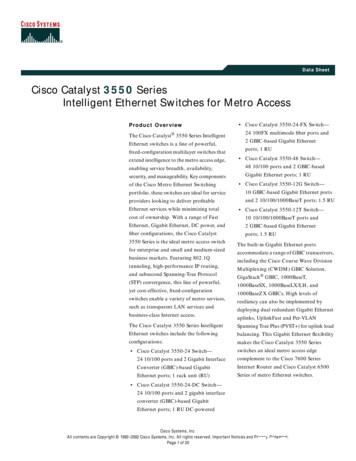NYC Metro – 2021 Workplace Hiring Trends
ACCENTURERESEARCHTech: NYCTECH HIRING TRENDSAPRIL 2021
EXECUTIVESUMMARYINSIGHTS
Hiring techtalent in 2021 Over half of respondents surveyed report theirorganization is planning to increase the number of techhires in 2021 as much as up to 20% above 2020; 62%expect to hire new talent to meet their tech resource needsover the next year. Organizations are looking to hire applicants withcybersecurity, Artificial Intelligence and cloud expertisein the next year. Respondents expect their organization will have difficultyhiring employees with Artificial Intelligence, cybersecurityand quantum computing expertise this year. Over half of respondents say senior level engineers arethe most difficult to find. Nearly a third say the inability to hire required talent willaffect their organization’s ability to innovate at the samepace. Respondents report they would use employee referrals,contract recruiters and personal networking to recruittalent; 57% believe contract workers will enable theircompany to access better talent pools. Over three-fourths report their company is targetingworkforce development programs for tech talent needs. Almost all respondents report their organization has notworked with nonprofit coding schools or apprenticeshipprograms in order to meet hiring needs. Most respondents report their organization is notinvesting in alternative talent pipeline programs.03
Hiring techtalent in NYC 83% of respondents report they are confident or veryconfident their company will be able to secure tech skillneeded from the talent pool in NYC this year. Boston, MA is the top city outside of NYC where techtalent is recruited, followed by Austin, Chicago, and SiliconValley. 44% say NYC is losing tech talent to other sities withBoston, Los Angeles and Dallas-Fort Worth markets beingthe top 3. Over half of respondents say more affordable housingwould help attract tech talent to stay in or relocate to NYC. 84% are confident or very confident that hiring withinNYC can help diversify their workforce compared to hiringfrom other cities. Respondents report quantum computing and ArtificialIntelligence skills are more plentiful in Silicon Valleycompared to New York City, while cybersecurity and cloudskills are fairly even in both markets.04
Reskilling the workforce The majority of respondents expect to hire new talentto meet their tech resource needs in 2021 while over halfexpect to reskill current talent to meet their tech capabilityneeds this year. Over two-thirds report new technology adoption typicallytriggers reskilling efforts in their company. All respondents report their organization is reskillingtech employees either through external course at techacademies, technical apprenticeships or on-the-job training.Remote work pre, during, andpost pandemic Over half of respondents surveyed report their companypreviously allowed only select employees to workremotely prior to COVID-19 compared to most employeesworking remotely today. Nearly three-fourths report technology innovation is atechnology activity currently being executed by a remoteworkforce due to the COVID-19 pandemic. 45% believe a remote workforce is sustainable for thelong-term, with some of their remote workforce remainingpermanently remote. 45% expect their company will have a hybrid modelwhen offices open safely – a quarter of employees will workremotely, and the remaining employees will return to theoffice. 49% of respondents report their organization plans toinstitute specific shift or rotational patterns for remoteworking while 48% report their organization is creating acorporate policy for specific groups of employees wherework is less location tied.05
CONCLUSION
01New York City Companies Bullish onTech Hiring as Recovery Efforts ContinueReport their organization is planning to increase the number of tech hires in 2021 by up to20% above 2020 and the majority expect to hire new talent to meet their tech resourceneeds over the next year. Organizations are looking to hire applicants with cybersecurity,Artificial Intelligence and cloud expertise and expect to have difficulty hiring senior levelengineers and employees with Artificial Intelligence, cybersecurity and quantum computingexpertise. Over three-fourths report their company is targeting workforce developmentprograms for tech talent needs, however most respondents indicate their organization isnot investing in alternative talent pipeline programs such as nonprofit coding schools orapprenticeship programs.02Confidence in being able to securethe tech skills needed from the NYCtalent poolThey are confident or very confident their company will be able to secure tech skill neededfrom the talent pool in NYC this year, respondents also indicate NYC is losing tech talent toBoston, Los Angeles and Dallas-Fort Worth markets. Boston, MA is the top city outside of NYCwhere tech talent is recruited, followed by Austin, Chicago, and Silicon Valley. Tech talentvaries - respondents report quantum computing and Artificial Intelligence skills are moreplentiful in Silicon Valley compared to New York City, while cybersecurity and cloud skillsare fairly even in both markets. Over half of respondents say affordable housing would helpattract tech talent to stay in or relocate to NYC.07
03 Reskilling Current Talent.Over half of respondents surveyed expect to reskill current talent to meet their techcapability needs this year. Over two-thirds say new technology adoption typically triggersreskilling efforts in their company. All respondents report their organization is reskilling techemployees either through an external course at tech academies, technical apprenticeshipsor on-the-job training.04 Changes to Return to Office EnvironmentsOver half of the respondents say their company previously allowed only select employeesto work remotely prior to COVID-19 compared to most employees working remotely today.Many (45%) believe a remote workforce is sustainable for the long-term, with some of theircompany’s remote workforce remaining permanently remote. 45% expect their company willhave a hybrid model when offices open safely – a quarter of employees will work remotely,and the remaining employees returning to the office in-person.08
DEMOGRAPHICS
This study was fieldedMarch – April 2021BoroughCityn 300n 300Brooklyn75Elizabeth, NJ30Manhattan97Hempstead, NY8Queens94Newark, NJ53Staten Island6New York City, NY180The Bronx28New Rochelle, NY13Other16Work in NYCYesn 300300Industryn 300Banking46Capital rsity5Healthcare Payer2Healthcare Provider22Insurance27Media & hnology/High Tech58NYC Employeesn 300Revenuen 300 50 billion or more17 20 to 49.9 billion25 10 to 19.9 billion57 6 to 9.9 billion74 1 to 5.9 billion127Title/Rolen 300Chief Financial Officer/CFO65Chief Information Officer/CIO61Chief Strategy Officer/CSO34Chief Technology Officer/CTO61Chief Marketing Officer/CMO61Chief Human NYC Tech Employeesn 3001,001-5,000138Average730.55,001-10,00040More than 10,0002010
RESULTS
Over half of respondents report their organization is planning to increase theirnumber of tech hires in 2021 by up to 20% above 2020Is your company planning to increase, maintain, or decrease the number of tech hiresin 2021 compared to 2020?Increase number of tech hires in2021 by more than 50% above20208%Increase number of tech hires in2021 by 21-50% above 202024%Increase number of tech hires in2021 by up to 20% above 202058%Maintain same number of tech hiresin 2021 as 2020Reduce number of tech hires in2021 compared to 20209%0%Don’t know83% of respondents report they are confident or very confident their companywill be able to secure tech skill needed from the talent pool in NYC this yearHow confident are you that your company will be able to secure the tech skills neededin 2021 from the talent pool in New York City?40%Very confident43%ConfidentSomewhat confidentNot confident17%Uncertain12
Almost three-fourths of respondents say their organization is looking to hireemployees with cybersecurity expertise in 2021In 2021, my company’s priority is to hire tech workers with the following expertise:Multiple responsesCybersecurity72%Artificial Intelligence (including machinelearning)64%Cloud63%Blockchain42%Quantum computing42%Web engineering41%38%Augmented Reality/Virtual RealityDesign thinking31%Mobile30%Product engineering30%Robotics23%Self-driving car technologyOther13%0%Not applicable, we do not have a priority tohire tech workers with specific expertiseOver a quarter of respondents believe their organization will have difficultyhiring employees with Artificial Intelligence expertise in 2021For which areas of expertise that you selected in the prior question do you expect tohave difficulty hiring in 2021? Multiple responsesArtificial Intelligence (includingmachine learning)28%Cybersecurity25%Quantum computing20%Cloud16%Augmented Reality/Virtual Reality14%Blockchain13%Design thinking11%10%Web engineeringRobotics9%Product engineering9%Mobile7%Self-driving car technology7%Other specified in q3We do not expect to have anydifficulties0%20%13
Almost half report quantum computing skills are more plentiful in SiliconValley compared to New York CityTo the best of your knowledge, where are the skills more plentiful for each of thefollowing?Artificia l Intelligence (includingma chine lea rning)28%Augmented 0%Design thinking38%33%28%0%Mobile35%Product engineering37%RoboticsQua ntum computingSelf-driving car technologyWeb 44%27%38%32%29%1%3%1%OtherNew YorkSilicon ValleyDon’t knowBoth are similarA little less than a quarter report Boston, MA is the top city where tech talent isrecruitedFrom which of the following cities are you recruiting tech talent outside of New YorkCity? Rank top five22%Boston, MA13%Atlanta, GA13%Silicon Valley/San Jose, CA/San Francisco, CA15%5%Philadelphia, PAHouston, TX2%Pittsburgh, PA2%Denver, CO1%Seattle, WA1%Raleigh, NC1%Portland, OR1%Not applicable, we are not recruiting tech talent outside of NYC17%5%Columbus, OHElsewhere27%6%Dallas- Ft. Worth, TXDon’t know30%6%Los Angeles, CASalt Lake City, UT28%8%Chicago, ILMinneapolis, MN23%11%Austin, TX42%20%21%17%TopTop Three9%13%10%3%3%7%3%0%1%1%2%2%14
44% say NYC tech talent is lost to Boston, MATo the best of your knowledge, which cities do you believe you are losing the most techtalent to? Select top fiveBoston, MA44%39%Los Angeles, CA33%Dallas- Ft. Worth, TX33%Austin, TX32%Houston, TXSilicon Valley/San Jose, CA/San Francisco, CA32%Chicago, IL31%Atlanta, GA30%Denver, CO27%26%Minneapolis, MN25%Philad elphia, PA25%Seattle, WA24%Columbus, OHPittsburgh, PA22%Portland, OR22%Salt Lake City, UT20%Raleigh, NC18%ElsewhereDon’t knowNot applicable, we are not recruiting tech talent outside of NYC2%1%62% expect to hire new talent to meet their tech resource needs over thenext yearHow do you anticipate meeting your tech capability needs over the next year?Multiple responsesHire new talent62%Reskill current talent52%Use artificial intelligence and/orrobotics52%Recruit gig-economy/contractworkers42%Leverage/create ecosystemalliances (external partners)Buy a company to securespecialized skillsCrowdsource37%30%29%Other15
Three-fifths say they would use employee referrals to help recruit talentWhich of the following would you use to help fill your talent needs?Multiple responsesEmployee referrals60%Contract recruiters54%Person al n etworkin g52%In-house recruiters52%Contractors38%Gig-economy (e.g., Upwork)28%OtherOver half report senior level engineers are the most difficult to findWhere do you experience the greatest difficulty in hiring engineers?Entry level engineer6%Mid-level – manager level (with 510 years of experience)36%Senior level – more than 10 yearsNot applicable, we do notexperience any difficulty in hiringengineers51%8%16
Over half of respondents report their companyallowed select employees to work remotely priorto COVID-19All respondents report their company allows atleast some of their employees to work remotelytodayPrior to the impact of COVID-19, did your office allowemployees to work remotely?Does your office allow employees today to workremotely?Yes, all employeesYes, all employees12%Yes, most employees28%Yes, most employeesYes, select employeesNo, employees are not allowed towork remotely12%57%3%48%Yes, select employees40%No, employees are not allowed towork remotelyOf respondent who work at a company thatallows remote work, 42% report more than halfof all employees work remotely and another 42%report less than half work remotelyA fifth of respondents report 30% - 39% of theirtechnology workforce is currently remotePlease complete the following statement: Among theemployees at my company who are allowed to workremotely, What percentage of your technology workforce iscurrently remote?Less than 10%Everyone works remotely3%13%10% to 19%More than half (but not everyone)work remotely42%Less than half work remotely42%4%20% to 29%19%30% to 39%20%40% to 49%18%50% to 59%Almost no one works remotely3%11%60% to 69%4%70% to 79%Don’t know9%80% to 89%5%90% to 99%100%4%3%Don’t know17
Almost a third say the inability to hire requiredtalent will affect their ability to innovate at thesame pace57% believe contract workers will enable theircompany to access better talent poolsIf you are unable to recruit the talent you need over thenext 12 months, how will that impact your business?Which of the following do you believe contract workerswill enable your companyto do? Multiple responsesWe would face immediate failureAccess better talent pools13%57%Attract talent at a point of needWe would not be as competitive55%25%Attract talent more easilyWe would face a reduction inmarket share53%20%Retain talent at a higher rateWe would not be able to innovate atthe same pace31%No impact at allEliminate costs associated with fulltime employeesNone of the above11%43%37%0%Over two-thirds report new technology adoptiontypically triggers reskilling efforts in theircompanyAlmost two-thirds say they reskill tech employeesthrough external course at tech academiesWhat typically triggers reskilling efforts in yourcompany?Multiple responsesWhich of the following are you using to reskill techemployees in your company?Multiple responsesNew technology adoption68%Shifts in industry/market trends53%Winning new business/clients53%External courses at tech academies65%Technical apprenticeships63%On-the-job trainingEmployee departures60%53%OtherOtherNot applicable, we do not offerreskillingNot applicable, we do not offerreskilling0%0%18
Almost three-fourths report technology innovation is now being executed by a remote workforcein their organization following COVID-1945% believe a remote workforce is sustainablefor the long-term, with some of their remoteworkforce remaining permanently remoteSince the crisis, which of the following technologyactivities are now being executed by a remoteworkforce? Multiple responsesDo you believe that remote working is sustainable forthe long-term?Technology Innovation (e.g., newproduct development)72%Testing & Deployment (e.g.,ongoing upgrades/deployments)Yes, some of our remote workforcewill remain permanently remote55%Core System Maintenance &Support (e.g., IT BAU)45%Yes, the majority of our remoteworkforce will remain permanentlyremote34%50%No, our remote w orkforce will returnto the office as soon as possibleApplication DevelopmentDon’t know21%49%Don’t know/Unsure1%1%45% expect their company will have a hybridmodel when offices open safely – with a quarter ofemployees working remotely and three-fourths inthe office49% of respondents report their organization plans toinstitute specific shift or rotational patterns for remoteworking while 48% report their organization is creatinga corporate policy for specific groups of employeeswhere work is less location tiedWhen offices can safely open, which of the followingbest reflects how employees at your company willwork?How will your organization implement remote workingon a long-term basis?Most all emp loyees will workremotelyMy organization is creating acorporate policy for specific groupsof employees, where work is lesslocation tied3%A hybrid model - 75% of employeeswill work remotely and 25% willreturn to office (i.e. in-person work)12%A hybrid model - 50% of employeeswill work remotely and 50% willreturn to office (i.e. in-person work)My organization plans to institutespecific shift or rotational patternsfor remote working36%A hybrid model - 25% of employeeswill work remotely and 75% willreturn to office (i.e. in-person work)49%45%OtherMost all employees will return to theoffice (i.e. in-person work)Don't know48%1%4%0%Don’t know2%19
A fifth of respondents say affordable housing currently attracts tech talentto stay in or relocate to NYCIn your opinion, what are the things about New York City that entice tech talent to stayin or relocate to New York City? Rank top three20%Affordable housing17%Diversity of people46%17%Diversity of industries48%15%Access to public transportationAccess to cultur al institutions,enter tainment, restaur ants, andsportsTop Three48%10%6%Top45%15%Access to educational institutionsAccess to parks and recreation43%38%32%OtherOver half of respondents say more affordable housing would help attract techtalent to stay in or relocate to NYCWhich of the following would help attract tech talent to New York City?Multiple responsesMore affordable housing52%A safe and healthy wor kspace46%Increased efforts around diversity44%Better public transportation37%More educational institutionsoffering tech training37%Lower state and city taxes35%Availability of affordable officespace34%Affordable office space33%More city/state grants for startupsand businesses looking to relocateIncr ease the number of incubator s32%28%Other20
84% are confident or very confident that hiringwithin NYC can help diversify their workforcecompared to hiring from other citiesOver three-fourths report their company istargeting workforce development programs fortech talent needsHow confident are you that hiring within NYC canhelp diversify your workforce, compared to hiringfrom other cities?What resources are you targeting for your tech talentneeds? Multiple responsesWorkforce development programs77%Internal up-skilling35%49%16%68%0%Tri-state area universities47%CUNY14%None of the aboveVery confidentConfidentSomewhat confidentNot confidentUncertainDon’t know1%Almost all respondents report their organizationhas not worked with nonprofit coding schools orapprenticeship programs in order to meethiring needsMost respondents report their organization is notinvesting in alternative talent pipeline programssuch as apprenticeshipsHave you worked with any nonprofit coding schools orapprenticeship programs to meet hiring needs?Are you investing in alternative talent pipelineprograms such as apprenticeships?YesNo9%Yes91%No13%87%21
needed from the talent pool in NYC this year. Boston, MA is the top city outside of NYC where tech talent is recruited, followed by Austin, Chicago, and Silicon Valley. 44% say NYC is losing tech talent to other sities with Boston, Los Angeles and Da
Grace Church [NYC 09] African Burial Ground National Monument [NYC 10] Brooklyn Bridge. Map C [NYC 11] St. Ann & The Holy Trinity Church [NYC 12] Fort Greene Park & Prison Ship Martyrs’ Monument [NYC 13] Lafayette Avenue Presbyterian Church [NYC 14] St. Nicholas Antiochian Orthodox Cathedral. Bibliography and Acknowledgments. Credits
United States Population by Metropolitan Size/Status, 1980–2010 2010 Population Shares by Metro Size (%) Chart 1 Chart 2 large metro ( 500k) small metro ( 500k) non-metro large metro 65.6% small metro 18.0% non-metro 16.4% Growth Rates by Metro Size 12% 12.5 14.3 10% 16% 14% 8% 6% 4% 2% 0% 1980–1990 1990–2000 2000–2010 10.9 8.8 13.1 10 .
Customers won’t need a timetable when Sydney Metro opens – they’ll just turn up and go. Stage 2: Sydney Metro City & Southwest From Sydney’s booming North West region, a new 30-kilometre metro line will extend metro rail from the end of Sydney Metro Northwest at Chatswood under Sydney Harbour, through
metro manila marikina 61 east drive marikina heights marikina city metro manila . metro manila rizal tomas cladio san juan morong rizal metro manila rizal 101 national road muzon taytay rizal . metro manila rizal lt 2 tagumpay st san jose montalban rizal metro
For regional metro, metro aggregation and metro access, Cisco Metro Ethernet Switching enables service providers to deliver profitable, comprehensive Ethernet services. With the effective integration of existing WAN services, such as Frame Relay and ATM, Cisco Metro Ethernet Switching offers an unmatched breadth of service delivery mechanisms.
Metro's integrated pest management plan supports Metro's toxics reduction goal set out in the Sustainability Plan for Metro Internal and Business Operations adopted by Metro Council in 2010 by Resolution No. 10-4198. Metro's toxics reduction goal is to eliminate the use or emissions of persistent, bioaccumulative toxics
A perspective of global metro evolution is helpful in contextualising the long adoption delay that metro has faced in India. Brief Global History of Metro systems A metro train is named "Metro" because it is most suitable for metropolitan cities with large populations. These systems generally operate at an average speed of 32-35 km/hr, and are
TARGET Questions & Answers 1 Mark Salient Features : Prepared as per the New Textbook for the year 2018. Complete 1 mark questions for all chapters. In-text, S, HOT Board Expected Questions (BEQ) & Answers. Useful for Public Exam 2019. SURA PUBLICATIONS Chennai HIGHER SECONDARY FIRST YEAR Sigaram Thoduvom ECONOMICS This material only for sample orders@surabooks.com For More Details 9600175757 .























